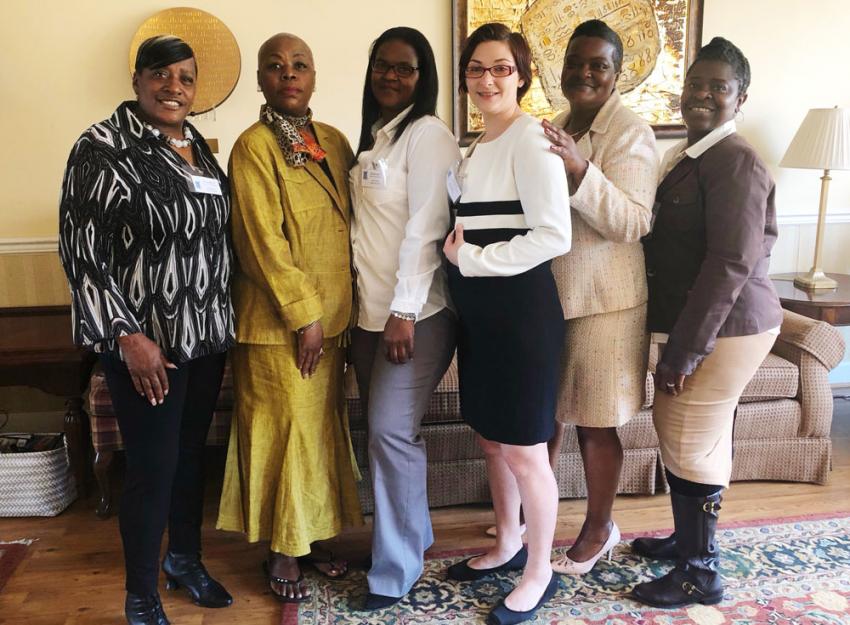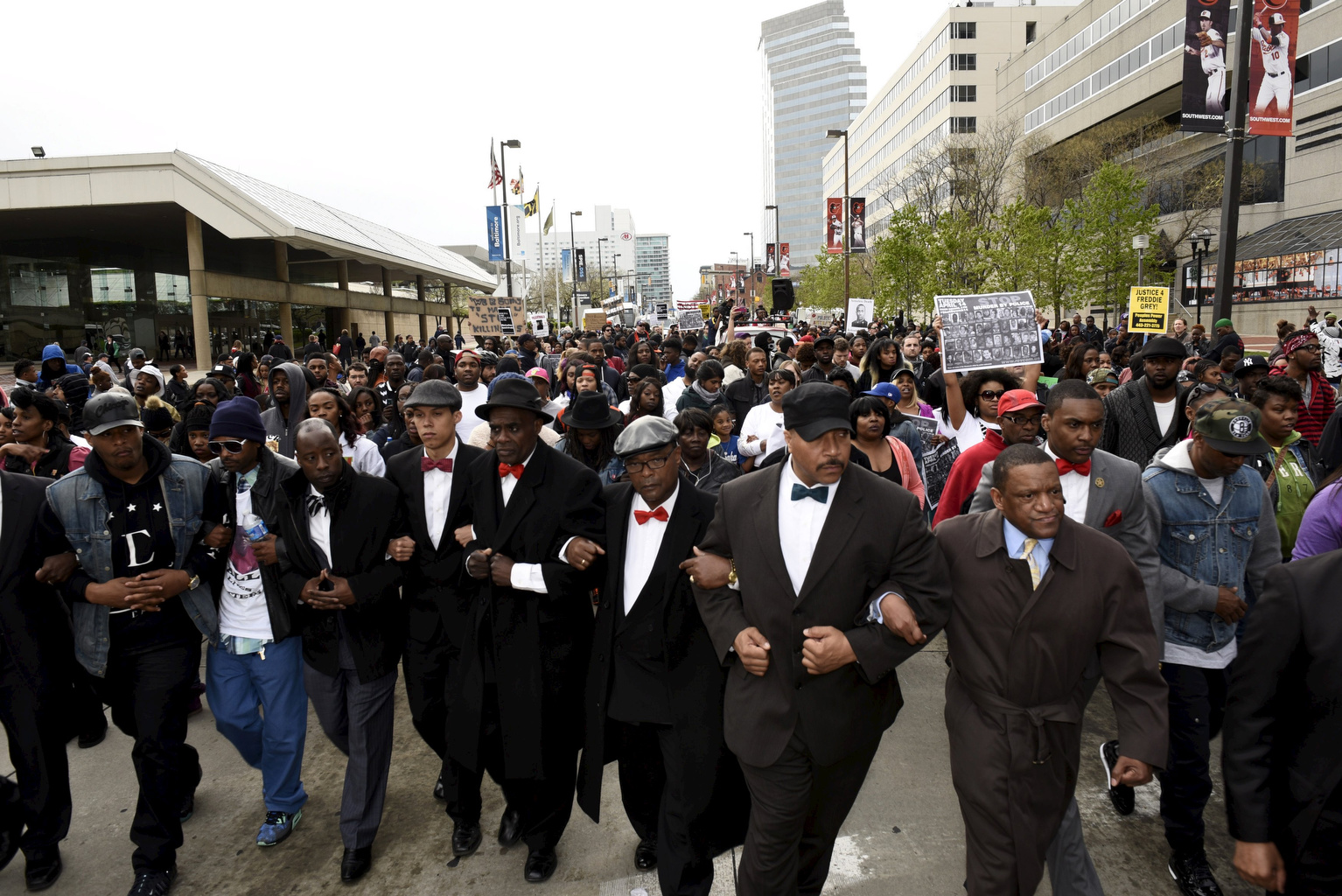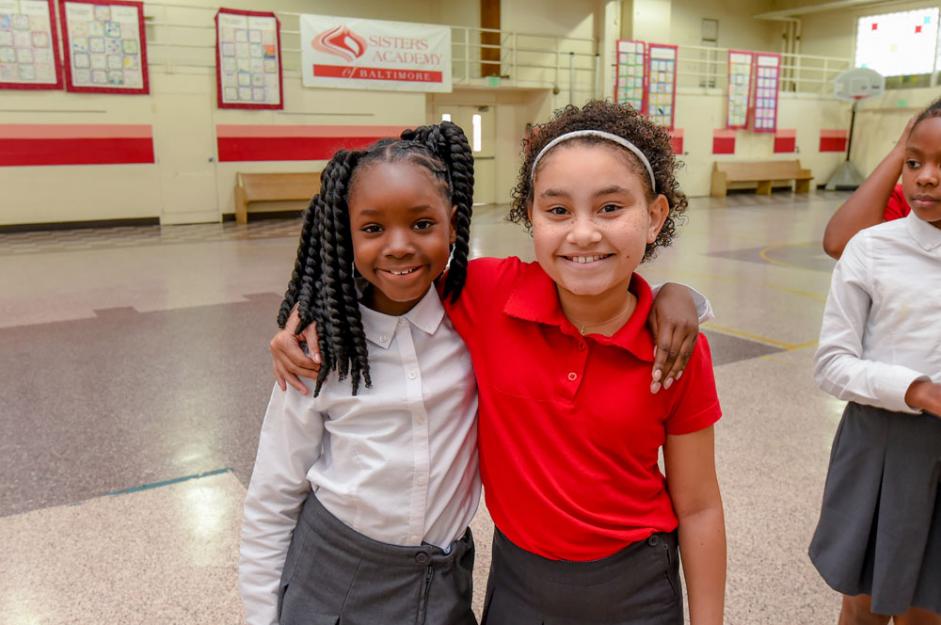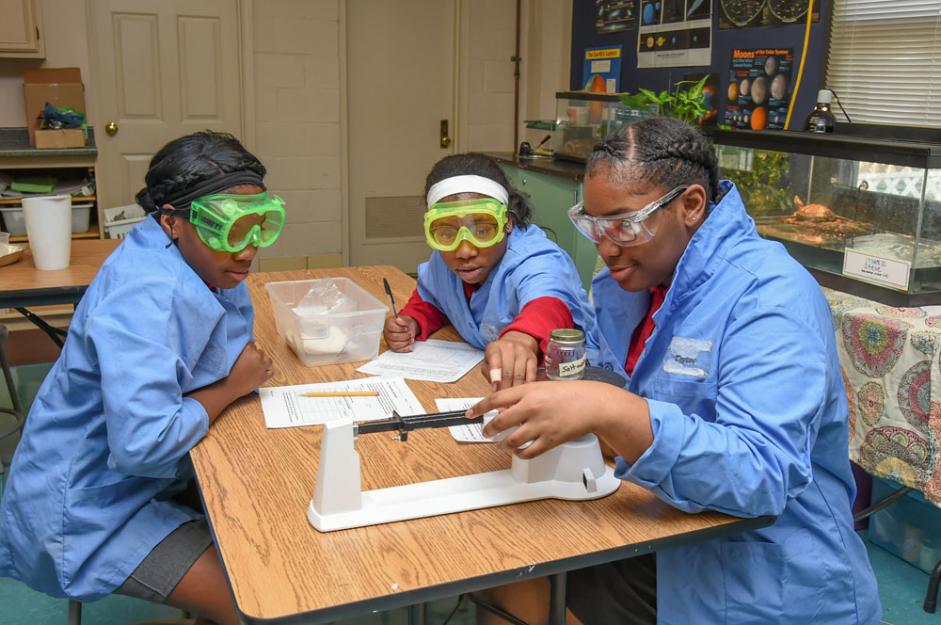
Marian House residents complete a mock interview in August 2018 as part of an eight-week job readiness program provided by the organization."We knew we wanted something with a forward thrust for women," said former Marian House executive director and Sister of Mercy Augusta Reilly of the Marian House's inception. "That's what our founder, Mother McAuley, wanted most." (Provided photo)
Imagine briefly what it would be like to be invisible. Sure, you could sneak around and get away with things, but mostly you'd live life unnoticed.
People would neither be aware of the good things you did, nor support you when you needed help.
1. Have you ever felt like your contributions or needs have been ignored?
2. What did that feel like?
In many societies, including ours, there are people who seem to count for less, and even among those people are folks treated as insignificant.
What can be done to restore and ensure their dignity?
In wake of Baltimore woman's slaying, Carmelites, others stress value of black women
Editor's note: This is the third story in a three-part series examining how sisters and others are working to heal cities divided after incidents of anti-black racism. Read the first and second stories.
Every night, the Carmelite Sisters of Baltimore gather in their monastery to watch the news. Because they're committed to a life of prayer that keeps them at the monastery, it's a ritual that keeps the sisters informed and, of late, somewhat horrified as they've watched story after story of police brutality against black people.
The sisters have been most shocked by the stories of police violence coming out of their own Baltimore. Sr. Judy Long's ongoing joke is to refer to her community as "Nuns Without Borders" because their prayers defy geographic limitations. But even so, said Sr. Patricia Scanlan, there's no mistaking that Baltimore is the sisters' raison d'être.
"We're known as the Baltimore Carmel. All of Baltimore — all that concerns Baltimore, all the people of Baltimore, the events, the happenings — are in our prayer," Scanlan said.
It's easy to equate police violence in Baltimore with the story of Freddie Gray, the 25-year-old black man who sustained fatal injuries to his spine while in police custody in 2015. Gray's death dominated public interest for more than a year and inspired days of protest and unrest.
But there's another story from Baltimore that speaks to the misogynoir, or the hatred and violence directed at black women. It persists not only in law enforcement, but also in the movements seeking to protect black lives.
Less than a year after Gray died, Korryn Gaines, a 23-year-old black woman, was killed by a white Baltimore County police officer who had come to her apartment with an arrest warrant following Gaines' failure to appear in court for a traffic violation.
Police say that after they obtained a key to the apartment, they found Gaines, a legal gun owner, inside, armed with a shotgun. A next-door neighbor said a SWAT unit had surrounded Gaines' apartment and drilled holes in the walls in order to install surveillance equipment. He also wrote that Gaines asked police to put down their weapons first. A six-hour standoff ensued, ending when Officer Royce Ruby Jr. — who has since been promoted to corporal — fatally shot Gaines and wounded her 5-year-old son, Kodi.
A few local protests were organized for Gaines, but she never became a household name like Gray.
"Unfortunately," wrote Sister of Notre Dame de Namur Gwynette Proctor, director of the Baltimore Archdiocese's office of black Catholic ministry, in an email to Global Sisters Report, Gaines' death was "overshadowed" by Gray's.
That a man's violent death would overshadow a woman's is hardly an isolated incident, as the African American Policy Forum explained in a 2015 report.

Demonstrators march to City Hall on April 25, 2015, to protest the death of Freddie Gray in Baltimore. Thousands of people marched peacefully through downtown Baltimore to protest the unexplained death of the 25-year-old black man while in police custody. (CNS photo / Sait Serkan Gurbuz / Reuters)
The new generation of anti-racist activists have done a superb job of outlining the ways in which black men are systematically criminalized, wrote researchers at the gender and racial equality think tank, and yet "black women who are profiled, beaten, sexually assaulted and killed by law enforcement officials are conspicuously absent from this frame even when their experiences are identical."
In conjunction with their report, the African American Policy Forum launched the #SayHerName social media campaign — an attempt to disrupt the tendency of national culture makers to ignore the deaths of women like Gaines (and Natasha McKenna and Yvette Smith and Shelly Frey and Rekia Boyd and Aura Rosser).
Yet, the tendency to overlook black women and girls doesn't begin with their deaths at the hands of law enforcement. Data suggests institutions like hospitals and schools — basically the very institutions that are supposed to support and protect people — have routinely disregarded the needs of black women and black girls for years.
And that's exactly where some sisters in the Baltimore area have seen an opportunity for change.
Black girls matter
Few women religious in Baltimore participate in protests against police brutality. In fact, none of the sisters contacted for this story had attended the demonstrations for either Korryn Gaines or Freddie Gray.
But what sisters have been doing is building institutions that aim to treat black women and girls with dignity and respect.
For some Baltimore congregations, this uplift has long been a mainstay of their mission. Notably, the Oblate Sisters of Providence, the first black order of nuns in the U.S., were founded in 1829 to educate black girls. Other communities have only more recently taken up the mantle.
Marian House, founded in 1982 by the Sisters of Mercy and the School Sisters of Notre Dame, is a holistic rehabilitation house for women leaving the Baltimore City Detention Center. While Marian House is not exclusively for black women, given that Maryland (like other states) over-incarcerates its black population, it comes as no surprise that most of its residents have been black.
Unlike more conventional transitional housing options in the area, Marian House makes it a point to address the systematic inequalities that drive women into prison or to lose their homes. Sister of Mercy Augusta Reilly, who served as executive director of Marian House from 1987 to 2003, told Global Sisters Report that the goal has always been to create homes for the residents and not just houses.
"You don't get over a criminal history, addiction, abuse and poverty in a house," she said. "You have to have support."

Two fifth-grade students in the Sisters Academy gym in the fall of 2018. "In our school, girls are leaders in every way," said School Sister of Notre Dame Delia Dowling, Sisters Academy president. "They aren't secondary to boys in any way." (Provided photo / Sharon Redmond)
Similarly, Sisters Academy is a joint ministry of the School Sisters of Notre Dame, the Sisters of Mercy, the Sisters of Bon Secours and the Sisters of Notre Dame de Namur that seeks to provide a high-quality, Catholic education to girls from low-income households.
The tuition-free middle school in southwest Baltimore, founded in 2004, is kept small by design. Of the 72 students enrolled for the 2018-2019 school year, 52 are black. There's only one white student.
The school's president, School Sister of Notre Dame Delia Dowling, said its goal is to foster not only academic success, but also social, emotional, physical and spiritual growth. A graduate support director works with the girls after they've graduated from the school, which is one of the reasons Dowling said they can boast a 100 percent graduation rate for their alumnae.
"We try to prepare them to take their seats next to people who maybe came up in a different way — a more privileged way," Dowling said.

Eighth-grade science students at Sisters Academy in the fall of 2018. In addition to a competitive academic program, the school also offers extracurriculars like sports and choir. (Provided photo / Sharon Redmond)
Currents of human consciousness
The Baltimore Carmelites, of course, don't run schools or rehab houses. But since the deaths of Freddie Gray and Korryn Gaines were first transmitted across their television screen, they've lent their charism to the work of anti-racism in their own way.
Overall, the sisters have spent more time praying, both corporately and individually, about white supremacy and racism. They've also embarked on a communal study of racism. To that end the sisters have invited theologians such as M. Shawn Copeland, Sister of Notre Dame LaReine-Marie Mosely and, most recently, Jeannine Hill Fletcher to the monastery to give presentations on racism.
The sisters' Sunday liturgies have become opportunities to encourage the many Baltimore educators who come to worship with them — a chance to make sure teachers are prepared spiritually to engage with their black students who may be traumatized by what's happening around them.
Sr. Connie FitzGerald, a contemplative theologian, visualizes the work she and her sisters do from the monastery as sending our love on the "currents of human consciousness." It's not an apostolic ministry, but it is an active one. "It's very active, and it's very demanding," FitzGerald said. "It requires an incredible faith — and a faith to live it for a lifetime."
But staying at the monastery while their city has — sometimes literally — gone up in flames in recent years has been a test of that faith for some sisters. Sr. Mary Fleig, for instance, said that weighing her devotion to Carmelite spirituality against her desire to join the Gray protests in 2015 marked one of the most difficult times in her religious life.
"I wanted to be out there in the city, marching and doing things," she said. "I really had to dig deep and ask if this life makes a difference. But I had to come down on the side of, yes, what we do here makes a difference and is worthwhile."
A common refrain among the sisters is that white supremacy isn't a fringe movement; it's embedded into the very laws of the nation. That's how we get to a place where black women and girls can be so devalued by the institutions around them.
And that's what the sisters of the Baltimore Carmel want to change on a cosmic level. They want to manifest in Baltimore and in the rest of the world the same communion they feel at the monastery, explained Sr. Celia Ashton.
"We're all held in God's love and God's embrace," she said. "I feel like it's a long way to making that reality, but what we do here and how we live our life — we really believe is transformative for the world."
1. Describe three ways in which sisters in Baltimore are working to offer dignity, opportunity and hope to African American women and girls.
2. What is the value of public protests in response to tragedies and injustice? How do they help to stir social change?
3. Some sisters missed the opportunity to join demonstrations that supported victims of injustice. How might their prayers and efforts make a difference?
St. Paul was pretty frustrated about divisions in the early church when he wrote his letter to the Christians in Galatia. He wants them to know that laws and boundaries set by humans didn't undo the equality we share through our faith in Jesus. He wrote:
"For through faith you are all children of God in Christ Jesus. For all of you who were baptized into Christ have clothed yourselves with Christ. There is neither Jew nor Greek, there is neither slave nor free person, there is not male and female; for you are all one in Christ Jesus."
1. What message does this send to people who've been treated as somehow less than human?
2. How is Paul's timeless reminder of our common equality important in today's world?
The church's belief that human dignity unites us – despite race, gender or any other factor that might divide us – echoes loudly in modern times. The church teaches:
"The social and political involvement of the lay faithful in the area of culture moves today in specific directions. The first is that of seeking to guarantee the right of each person to a human and civil culture 'in harmony with the dignity of the human person, without distinction of race, sex, nation, religion or social circumstances.' This right implies the right of families and persons to free and open schools, freedom of access to the means of social communication together with the avoidance of all forms of monopolies and ideological control of this field; freedom of research, sharing one's thoughts, debate and discussion."
Compendium of the Social Doctrine of the Church, citing the encyclical Gaudium et Spes of the Second Vatican Council.
1. The article states that culture makers overlook discrimination and violence against black women. Why is it important to tell painful stories about all oppression, regardless of the background of its victims?
2. Sisters have stepped up to empower women trying to rehabilitate their lives as well as young African American schoolgirls. What impact do you imagine their efforts might have?
The Baltimore Carmelites don't leave their monastery, but they do pray for and with people involved in their city's racial tensions. Silence and solitude are essential parts of their daily life.. Read this brief reflection about the importance of silence, then take five minutes on your own for silent prayer, just listening to God.
1. What message or hope for the future emerged in your silent time?
2. Can you see value in making time for silent prayer as you look toward your own future?
1. Watch this video about Sisters' Academy. Then brainstorm:
- Three words or phrases about its mission
- Three words or phrases about how it affects its students
- Three words or phrases that it sparks as you think about your own education
2. Watch this video about Marian House. Then brainstorm:
- Three words or phrases about its mission
- Three words or phrases about how it transforms the lives of women
- Three connections you can make between these women's lives and your own life
Help us to see with your eyes, Lord.
Help us to see all people as equal, regardless of their race, gender or other differences.
Help us to see potential and opportunity that can emerge from desperate moments.
Help us to see hope that emerges when we come together as your people.
Help us to see your love in all we encounter.
Amen.
Tell us what you think about this resource, or give us ideas for other resources you'd like to see, by contacting us at [email protected]
